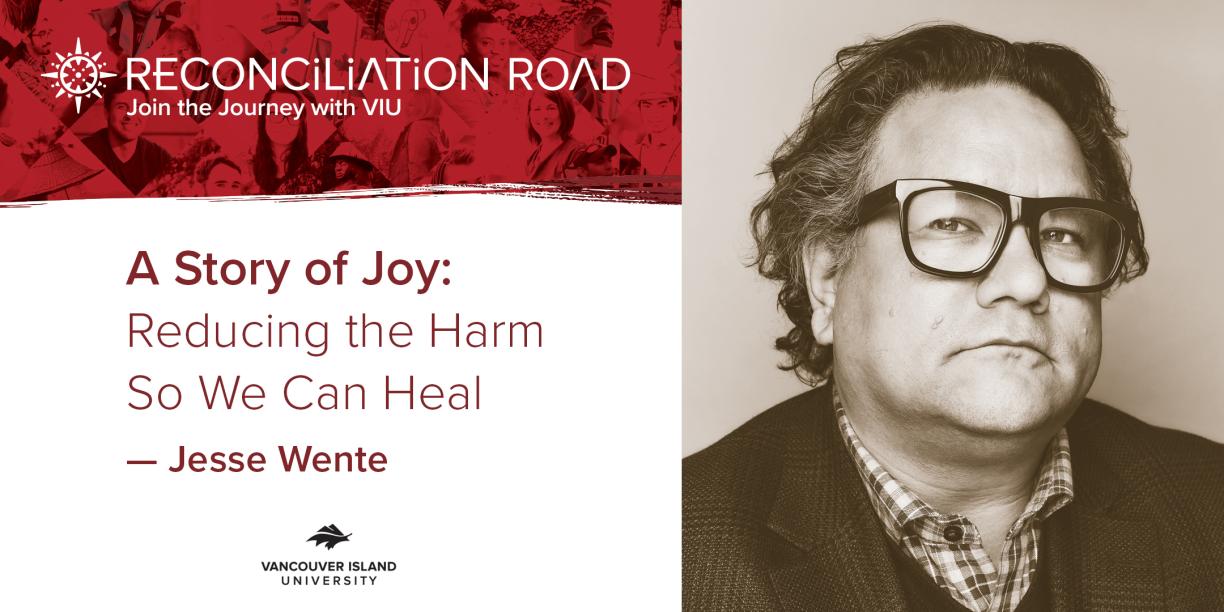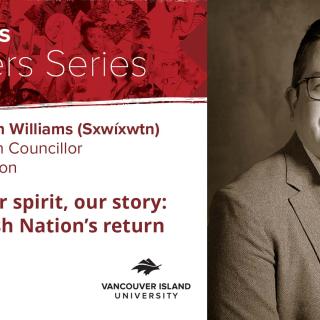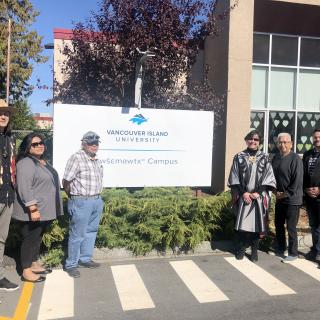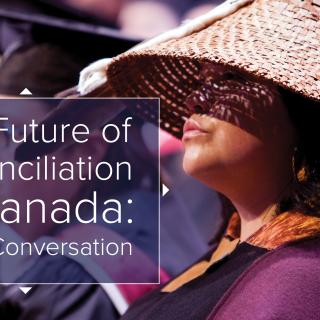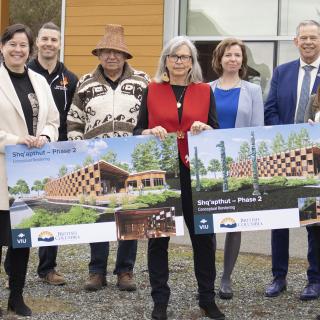Jesse Wente, an Anishinaabe writer, broadcaster, speaker and arts leader, shares his perspective on Canada’s truth and reconciliation process during VIU’s sixth annual Indigenous Speakers Series on Wednesday, November 25.
Jesse Wente is taking a harm reduction approach to the truth and reconciliation process by amplifying the voices of Indigenous peoples.
The Anishinaabe writer, broadcaster, speaker and arts leader, who is an outspoken advocate for Indigenous rights and First Nations, Metis and Inuit art, has committed himself to supporting Indigenous storytellers and advocating for Indigenous narrative sovereignty. While he doesn’t see efforts to Indigenize or decolonize colonial institutions as being very successful now or going forward, he is hopeful about effecting real change by raising up the voices of those who have traditionally been marginalized under current structures.
“I view my job as harm reduction – to reduce the harm that colonial institutions do to my community and, frankly, to almost everyone – and to make life more livable, while we’re living here in the now,” says Wente, who was born and raised in Toronto and is a member of the Serpent River First Nation.
Wente will be sharing more on this topic during Vancouver Island University’s (VIU’s) sixth annual Indigenous Speakers Series on Wednesday, November 25. The annual event, a partnership between VIU and CBC Radio One’s Ideas, aims to further the dialogue on truth and reconciliation between Indigenous and non-Indigenous peoples in Canada. It will be held virtually this year via Zoom webinar due to the COVID-19 pandemic.
Wente, who is best known for his 24 years as a columnist for CBC Radio’s Metro Morning, originally wanted to be a filmmaker after seeing Star Wars as a child. He enrolled in film school and in his graduating year of the Cinema Studies program at the University of Toronto, was in need of a summer job. He applied for an Indigenous-specific internship position at the CBC and was hired.
“When I told my parents I got a job in radio, my Dad’s reaction was, ‘But you don’t talk,’” he remembers. “No one expected this would be my career path, but it turned out I was decent at it.”
Soon Wente became the film critic for Metro Morning and over time, his role evolved into “pop culture critic” – a role he says simply meant that he could come on air and talk about what he felt like talking about that day. While he was enjoying that work, it didn’t provide many opportunities to raise up Indigenous voices. One notable exception he remembers is his review of Avatar – which he described as a “colonial fantasy” and a huge step backward for Indigenous representation in film.
“The response from my community was overwhelmingly enthusiastic – I received a flood of text messages from people just saying, ‘Thank you, I’ve never heard anything like that on the radio before,’” he says. “From that point on, my Indigenous lens started creeping in more and more.”
Wente began to focus on the advancement of Indigenous art and narrative sovereignty. His position as a highly rated CBC columnist created opportunities for him to join a number of different boards, including the Toronto Arts Council; The ImagineNative Film and Media Festival, where he served as a film programmer; and the Native Earth Performing Arts, where he served as president. He was recently appointed to Chair of the Canada Council for the Arts – the only First Nations person to ever hold that position.
He also served as Director of Film Programs at the Toronto International Film Festival’s Bell Lightbox until recently, where he co-produced the award-winning screen adaptation of Thomas King’s bestselling book, The Inconvenient Indian.
Wente describes this kind of work as vital harm reduction work. As more diverse voices are heard, he describes the effect as an opening up from the bottom to let the flood waters spill in, letting them rise until a cultural shift is possible. As Chair of the Canada Council for the Arts, he plans to use his position to continue this opening up and is hopeful that it can be a model for other Crown organizations.
“Statements about supporting diversity and inclusion are meaningless without an actual sharing of power,” says Wente. “If the systems are better for those who are marginalized, that means they are better for everybody. We’ve been talking and learning for a very long time, and the listening and learning is good, but that doesn’t mean you can’t take action.”
Wente’s keynote lecture – A Story of Joy: Reducing the Harm So We Can Heal – takes place via Zoom webinar starting at 6:30 pm PST. The talk will be followed by a question and answer session hosted by Nahlah Ayed, host of CBC Radio’s Ideas. It will be recorded for national broad. To register for this free event, please visit this registration link.
-30-
MEDIA CONTACT:
Jenn McGarrigle, External Communications Advisor, Vancouver Island University
C: 250.619.6860 | E: Jenn.McGarrigle@viu.ca | T: @VIUNews

